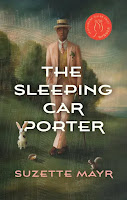Recent Reading: The Thick and the Lean by Chana Porter
Stories that deal with our evolving and often dysfunctional relationship with food have been a running thread through science fiction for decades. Isaac Asimov's "Good Taste" imagines a society in which eating natural-grown food is considered grotesque and disgusting. Adam Roberts's By Light Alone invents a technology that allows people to photosynthesize nutrients from the sun, which immediately turns the consumption of food into an elite status marker. In contrast, the elites in Sarah Tolmie's NoFood have undergone a surgical procedure to remove their GI tracts, which makes visiting a restaurant an experience not unlike immersive theater. More recently, Meg Elison's Hugo-nominated story "The Pill" imagines a society which invents a no-fuss cure for fatness, and then insists that everyone should take it. With her second novel, Chana Porter adds to this tradition, but complicates it with a core SFnal setting. The Thick and the Lean is set on an al...
